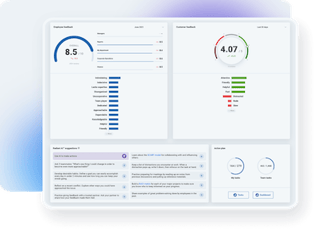
How AI is Shaping Continuous Feedback and Performance Management Strategies
Artificial Intelligence (AI) is no longer a buzzword – it’s a powerful tool that is revolutionizing the way businesses manage employee performance. Traditionally, performance management has relied on labor-intensive administration and subjective performance reviews. With recent advances in generative AI and large language models, HR leaders can automate routine tasks, enable continuous feedback, assist with goal setting, facilitate targeted training, and significantly boost employee engagement, all without additional administrative labor.
Forbes Advisor reports that 97% of business owners predict that new generative AI applications like ChatGPT will benefit their business. At the same time, over 40% of business owners are concerned about technology over dependence and ethical considerations in the wake of these advancements. This blog will explore key areas of modern performance management to examine the impact of AI and how organizations can use AI-assisted tools to foster a more productive and engaged workforce that drives business success in 2025 and beyond.
Automating Routine Performance Management Tasks
By leveraging AI, organizations can significantly improve the quality and efficiency of their performance management processes. This allows for better-informed, data-driven decisions, improved performance, and a more engaged and productive workforce. Some of the main areas benefiting from AI include:
-
Data Automation: AI’s ability to automate data collection and analysis is a game-changer in performance management. It quickly sifts through vast amounts of data, identifies patterns, and delivers actionable insights. This not only saves valuable time but also ensures a more accurate and objective analysis, free from human bias.
-
Performance Reports: AI performance management tools can generate comprehensive performance reports automatically. This eliminates the need for HR personnel to spend hours compiling data while resulting in detailed, consistent, and accurate reports that provide a holistic view of an employee’s performance.
-
Data-driven Reviews: Traditional performance reviews can be subjective and time-consuming. AI transforms this process by driving performance reviews based on data rather than perceptions, offering a more accurate, fair, and meaningful assessment of an employee’s performance.
-
Process Streamlining: Beyond automating individual tasks, AI streamlines the entire performance management process. From setting goals and providing feedback to tracking progress and identifying training needs, AI makes the process more efficient and effective, reducing errors and bias.
While integrating AI into business operations presents challenges, such as the concern 1 in 3 business owners have about technical deployment, thoughtful implementation can effectively address these issues.
By focusing on personalization and versatility in AI system deployment, businesses can seamlessly adopt evolving technologies to their existing frameworks.
Enabling Continuous Feedback
Overcoming Traditional Review Limitations and Providing Ongoing Feedback: Traditional performance reviews often fail to provide the timely and relevant feedback employees need to grow and improve successfully. According to recent studies, 95% of business managers are dissatisfied with their current performance review systems due to information inaccuracies and performance bottlenecks. AI overcomes these limitations by enabling HR managers to provide continuous feedback with real-time performance-tracking tools.
Personalized Feedback Mechanisms and Learning-oriented Culture: Using AI-assisted systems, businesses can collect and analyze data in real-time and provide instant feedback to employees, complete with impartial interpretations of their performance based on their full histories; past, current, and future. This encourages personalized learning, which engages employees in their career journey with dynamic and responsive paths to upskill in their field and advance their careers, which are top priorities for modern employees.
Instead of relying on months-old performance metrics, AI can provide relevant, actionable feedback, opening the door for HR managers to deploy more effective coaching systems in their performance management workflows. AI chatbots provide one such way for HR managers to give employees a sounding board in their feedback system, a way to self-direct their improvement by accessing a system armed with impartial assessments of their performance, including their personalized career goals.
This continuous, personalized feedback fosters a learning-oriented workplace culture that engages modern employees with frequent, constructive feedback. It encourages employees to continuously learn, adapt, and improve, shifting the focus away from performance evaluations to performance development. Employees will no longer fear performance reviews when their learning and development are emphasized more than their mistakes.
Building on this foundation, AI empowers organizations to adapt to evolving assessment standards by equipping HR managers with real-time performance data, accurate performance histories, and integrated instant feedback systems. As AI continues to evolve and improve, we can expect even more transformative changes in the way we provide and receive feedback in the workplace.
Assisting with Goal Setting
Analyzing Historical Goals and Recommending Future Ones: Goal setting is a crucial yet complex aspect of performance management. As companies gain new ways to collect massive amounts of performance data, they need automated systems to analyze it impartially and provide actionable feedback strategies based on real-time assessments. AI-assisted performance management tools do this by conducting in-depth analyses of an employee’s historical goals, including the targets they hit, their areas of improvement, and the reasons for their performance changes.
This system of analysis allows HR managers to track employee OKRs more realistically and provide relevant feedback that accounts for the employee’s abilities and goals in real time. Additionally, by using predictive analytics, managers can go beyond analyzing past goals to start forecasting future achievement timelines as well. The AI system can suggest ambitious yet achievable goals for each employee based on their past performance, current abilities, and potential for growth.
Aligning Goals and Auto-generating Drafts: Aligning individual goals with business objectives is critical for organizational success. However, this alignment can be challenging to achieve, especially in large organizations. This is why new advancements in generative AI like language learning are so critical for success – they allow AI-assisted systems to align objectives and goals more effectively than was previously possible. For example, AI can identify where there’s alignment and where there’s a gap, and suggest ways to better align individual goals with business objectives. AI can also now auto-generate the first drafts of an employee’s performance review, providing an impartial starting point for the HR team to discuss and refine. This facilitates the personalization of the performance management process while saving administrative time and labor.

Bring feedback data and manager experience together
Automatically create personalized performance materials like meeting agendas and reviews, OKRs, SMART goals, and more. See how it works
By leveraging AI, organizations can make the goal-setting process more efficient, effective, and aligned with both individual and organizational needs. This not only improves individual performance but also contributes to overall organizational success. As AI continues to evolve and improve, we can expect even more transformative changes in the way we set and achieve goals in the workplace.
Facilitating Targeted Training
Identifying Specific Training Needs: Training is a key component of performance management, but identifying the specific training needs of each employee can be a challenge to perform at scale. AI simplifies this by analyzing performance data and identifying areas where an employee may need additional training or development. This targeted approach ensures that each employee receives the training resources they need to improve their performance and reach their full potential.
Tracking and Analyzing Employee Engagement: As recent studies conducted by McKinsey Digital demonstrate, AI adoption will have the most productivity impact on education, workforce training, business legal training, and office support workflows. Systems that target high-level performance and skills training tasks will allow HR managers to engage employees in a more productive learning process. AI can track and analyze various indicators of employee engagement, such as participation in training programs, feedback, and performance trends. This provides valuable insights into how the training impacts employee engagement and highlights areas for immediate improvement to better meet employee expectations. As a result, engaged employees are more likely to be productive, motivated, and committed to their work, ultimately enhancing overall performance.
Ensuring Success in Role-specific Tasks: In addition to providing HR managers with more feedback analysis tools, AI-assisted performance management systems can also increase the personalization of employee learning paths in role-specific tasks. AI can analyze performance data related to an individual’s role, identify areas of improvement in advanced skills gap analyses, and recommend targeted training programs to help the employee improve in these specific areas. This personalized, role-specific approach helps HR managers provide relevant training that is directly tied to actionable performance improvement.
Recommending Relevant Training Programs: Many organizations struggle to match training resources with the right employees at the right time. AI addresses this by recommending programs based on performance data, learning styles, and preferences, ensuring training is relevant and engaging. This leads to improved performance and a more skilled workforce. As AI advances, its role in targeted training will grow, enhancing performance management and business outcomes. Additionally, recent advances in AI, including Virtual Reality (VR) and Augmented Reality (AR), enable the creation of high-tech training programs. These tools allow employees to engage virtually with products, realistically simulate soft skills training, and bridge physical distances in remote and hybrid work environments.
Boosting Employee Engagement
Cultivating a Sense of Belonging and Providing Personalized Feedback: AI-assisted performance management tools allow HR managers to cultivate a sense of belonging that is critical for employee engagement. Using its ability to understand individual needs, preferences, and performance goals, AI can tailor the employee’s performance journey with personalized training programs, feedback, rewards, and recognition. This personalized approach not only fosters a shared commitment to organizational goals, enhancing loyalty and productivity, but also boosts a sense of belonging among employees. Additionally, AI can analyze an employee’s performance data and provide feedback that is tailored to their specific needs and circumstances. This personalized feedback is more meaningful and effective, leading to higher engagement levels.
Elevating Wellness and Employee Productivity: With higher engagement comes increased wellness as businesses modernize their work environments to focus on the individual employee’s experience, reducing well-known indicators of low productivity and high turnover in stress-susceptible workers. By providing personalized feedback, identifying training needs, and creating relevant training and wellness programs, AI can help employees continuously learn and adapt while feeling fulfilled in their work environment. This not only boosts their skills and performance but also their engagement as they feel valued and supported in their professional development.
Boosting Engagement with Gamified AI Strategies: In addition to improvements in wellness, AI-driven engagement strategies can include gamified elements to further increase engagement. Gamified AI systems such as leaderboard tracking, personalized recognition, and badges can help drive productivity by increasing workplace engagement and lowering the turnover risk. These elements tap into intrinsic motivators, such as competition and achievement, making work more enjoyable and rewarding. As organizations continue to adopt these innovative strategies, they can expect to see significant improvements in both employee satisfaction and overall performance.
AI and Data Privacy in Performance Management
Despite its numerous benefits, AI-driven performance management systems present new privacy concerns to businesses of all sizes. With so much employee data stored in one system, access management becomes a critical component of maintaining employee trust, especially after years of collecting and analyzing employee performance goals and feedback histories with these new systems.
Modern businesses must ensure that their systems comply with the latest data protection regulations, including:
- GDPR: The General Data Protection Regulation establishes guidelines for how an individual’s data is collected, analyzed, and used by companies, ensuring that individuals retain control over their identities while holding companies responsible for data misuse or breach. While the GDPR applies to the EU, Article 3 establishes its extraterritorial scope in the US.
- CCPA: The California Consumer Privacy Act, updated at the time of writing as of March 2024, establishes the rights of individuals to know how their information is collected, used, and shared by companies, including the right to delete personal information, opt out of information sharing, and be free from discrimination.
In addition to following legal guidelines for data collection compliance, businesses should also internalize data privacy challenges as the scope of data collection increases. As Deloitte reported in their State of Ethics and Trust in Technology report, a business’s reputation can be damaged among employees and consumers when ethical data collection practices are not clearly established, with 38% of businesses reporting reputational damage as a major concern. Diligent human oversight of AI systems and clear assessments of privacy risks remain a priority for top-performing businesses moving forward.
In addition to adhering to legal guidelines, selecting a secure platform like Macorva can help address privacy concerns. With robust encryption, compliance with industry standards, and secure access management, Macorva ensures that employee data is protected, maintaining trust and integrity in AI-driven performance management systems.
Integration of AI with Other HR Technologies
As businesses expand their data collection frameworks with new performance management tools, they risk compromising the efficiency of their existing HR frameworks. HRIS, ATS, and other HR systems must be integrated with new AI performance management systems to create a unified HR ecosystem.
An example of the importance of systems integration comes from multi-regional companies like PPC Partners Inc. that struggled to deploy consistent employee feedback among its 2,500+ employees before adopting Macorva's AI-driven employee survey solutions. Using Macorva’s integrated ADP solution , they enhanced their ability to gather and analyze workforce engagement data across four distinct contracting and construction companies in various regions. Driven by AI data analysis, demographic-based insights became far easier to collect and use, allowing HR managers to personalize training engagement to their employee needs.
As employee participation rate exceeded 70% post-adoption, PPC remains a stark example of the effectiveness of AI tool deployment in performance management workflows. Solutions like Macorva not only integrate smoothly with existing company infrastructure but also elevate data collection and analysis, leading to more personalized and effective employee engagement strategies.
The Role of Generative AI in Performance Management
As technology advances, new tools like ChatGPT will play a critical role in determining the success of AI performance management strategies. Integration with these tools enables HR managers to generate the first drafts of employee performance reports, which can be refined to meet organizational objectives. ChatGPT and similar tools can also create personalized action plans for employees based on vast amounts of performance data, far more than a human HR team could feasibly analyze.
By bringing together multiple sources of data, generative AI can serve as a powerful organizational network analysis tool. It can take dispersed company data -which today includes corporate email, feedback histories, Slack conversations, Microsoft Teams meetings, and numerous other communication frameworks- and connect the dots. This creates a streamlined snapshot of actionable performance management strategies.
While generative AI offers powerful capabilities in performance management, it's important to consider potential challenges, such as internal biases. In a study conducted by Textio, researchers found that ChatGPT’s ability to organize vast amounts of data eliminated personal biases yet created new statistical biases. In its analysis of its AI-generated performance reviews, Textio found that ChatGPT referred to the gender of employees based on the statistical likelihood that they would hold a certain position regardless of their stated gender. This highlights the need for careful oversight by HR management teams when using AI in complex performance management workflows. The right tool, like Macorva’s AI-powered performance review workflow, can help mitigate these issues by ensuring AI outputs are treated as starting points to be refined, rather than replacements for genuine performance feedback conversations.
To learn more about emergent biases in generative AI performance management systems, including how to combat them in a modern HR ecosystem, consider this blog on How AI Reduces Bias in Employee Performance Reviews.
Measuring the ROI of AI in Performance Management
While aspects of AI integration in performance management can be observed, such as increased learner engagement and skill development, businesses must closely evaluate key performance indicators (KPIs) to ensure successful integration with their existing HR workflows. To that end, AI-powered performance management systems can conduct cost-benefit analyses of the business’s current systems, including creating long-term impact studies of the new workflows based on multichannel data metrics. For example, they can assess employee productivity by analyzing data from time-tracking tools and communication platforms, or evaluate training effectiveness through learning management systems and employee feedback.
As businesses adapt to the presence of AI in their performance management workflows, they must also allow the workflow to change based on the new capabilities and limitations of AI-assisted systems. While AI, especially generative AI, offers exciting new opportunities, it requires thoughtful implementation and ongoing refinement by HR teams. The time saved on automated tasks like review generation and data analysis can be redirected to important tasks such as ensuring compliance, enhancing employee experiences, and seamlessly integrating workflows.
Future Trends in AI-Driven Performance Management
Traditional performance reviews are often criticized for being time-consuming, subjective, and failing to provide the real-time insights needed in today's fast-paced business environment. AI is poised to revolutionize performance management by offering data-driven insights, personalized recommendations, and continuous feedback. 2024 is the year of AI adoption in business, with over two-thirds of businesses in every region reporting AI deployment in their organizational systems
With the rise of technologies like IoT and edge computing, organizations can now collect and analyze even more performance data. Imagine AI algorithms processing data from employee wearables, collaboration platforms, and project management tools to provide a holistic view of individual and team performance. This data, coupled with advancements in generative AI, can enable personalized learning recommendations, automated feedback generation, and even predict potential performance issues before they arise.
Furthermore, by leveraging blockchain technology, organizations can ensure data security and privacy, building trust and transparency in the performance management process. AI is not meant to replace human interaction but to augment it. By automating routine tasks, AI frees up managers to focus on what matters most: coaching, mentoring, and fostering a culture of continuous growth.
Conclusion
Artificial Intelligence is undeniably transforming the landscape of performance management. By automating routine tasks, providing personalized feedback, aiding in setting realistic and aligned goals, and facilitating targeted training, AI-enabled systems help HR managers create a more engaged and productive work environment. The productivity gains that AI brings not only advance organizational success but also cater to every individual employee’s growth and contentment. As AI frees up time for HR leaders and managers to focus on strategic initiatives, they can foster a more learning-oriented culture that motivates employees to continuously improve along their own personalized career paths.
The increased employee engagement that AI promotes can contribute to a more skilled, capable, and satisfied workforce, ultimately driving business success and workplace positivity. While AI offers numerous benefits, it's important to maintain a human touch to address any potential biases and ensure smooth implementation.
As organizational needs evolve and AI technology continues to advance, businesses can expect transformative changes in performance management by successfully integrating AI systems with their current HR workflows. With AI powering the future of business, companies should explore versatile solutions, such as systems powered by Radiant AI®, to stay ahead of advancements and embrace the opportunities AI presents to managers and workforces of the future.











